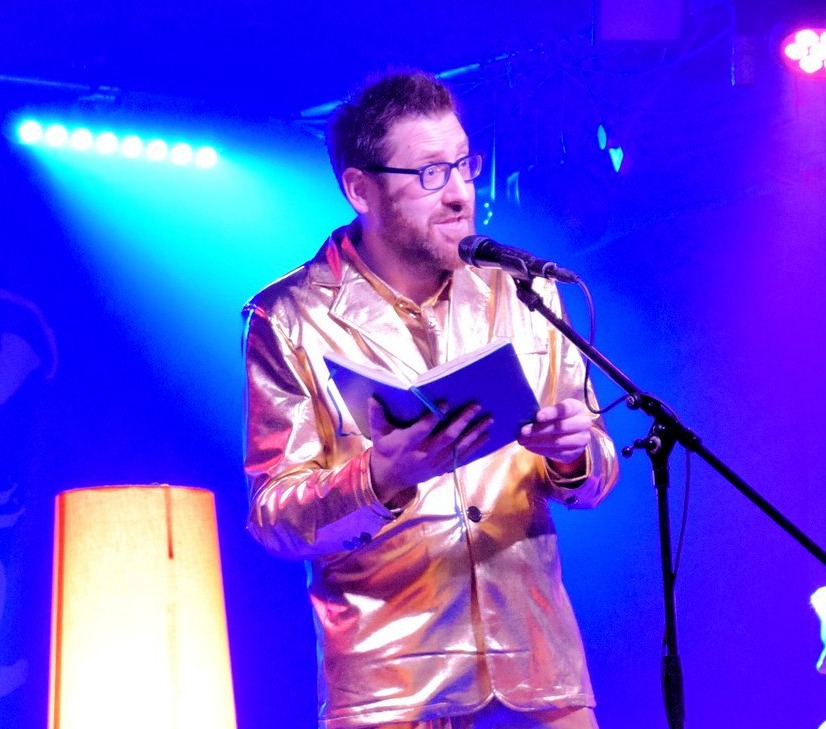For full playlist select Spotify icon
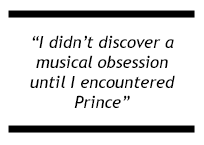
Prince - Dirty Mind - 1980
When I was a kid, I loved pop music, but only in the way that everyone else did. I never focussed on anyone in particular. I liked Duran Duran, A-Ha, Erasure, Tear for Fears, Nik Kershaw. Occasionally I would try, in small ways, to look like them. I cut up my gloves after I saw Roland Orzabal wearing a fingerless pair in the video for Mad World. Used my sister’s hairspray in an effort to work up a style similar to Nik Kershaw’s. But I didn’t discover an actual musical obsession until I encountered Prince, who was so intangible that I wouldn’t have dreamed of attempting to imitate him.
Aspiring to be like Prince would have been madness, like saying that when I grew up I wanted to be the A-Team van or a brass doorknob. He blurred the lines of music, race, gender and sexuality and I was not able to identify with him at all, which was one of the many things that I liked about him. If I could identify with a musician, it meant that they had the mentality of a tragically frustrated 13-year-old boy and that would’ve been revolting. I had no idea how to label Prince and that was brilliant. I knew that he was supernaturally talented. That he could sing, dance and play any instrument both masterfully and effortlessly, as if it was an extension of his own body. The problem was that not everyone appreciated this because they couldn’t get over the fact that he kind of freaked them out. As a result, I struggled to find someone to share my enthusiasm with.
Eventually I found Daniel, a buck-toothed kid from Warrington who’d moved to our town during my first year of high school and was the only other person I could find who was willing to publicly admit to liking Prince. He didn’t mind being seen as weird. As a vegan in 1989 and bearing a set of teeth you could use to prise open a paint can, he was already pretty used to being singled out. During lunch breaks the two of us took to sitting together at the end of the playing fields, away from the other kids, talking Prince. A pair of side-lined losers, we traded albums with one another, making cassette copies of Lovesexy, 1999 and Controversy, each lovingly decorated with fan art. Daniel got into the habit of filling the blank spaces at the end of the tapes with short lectures and his commentary on books or news articles he’d found. It was kind of like a podcast, but for an audience of one (so, very much like most podcasts) and I began to look forward to these tapes almost as much as I did the albums themselves. The copy of Dirty Mind he made for me has corrupted that album to such a degree that when I listen to it today, a part of me still waits for Daniel’s voice to kick in after Partyup has finished. And now, whenever I hear When You Were Mine, I can’t help but picture Daniel at the end of the playing fields, singing that song in his adolescent squawk and blissfully dancing for the benefit of the only audience who would appreciate it.
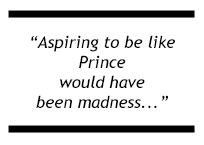
Red Hot Chili Peppers – Blood Sugar Sex Magik - 1991
My love of music became all-consuming in the early 90’s. I enrolled in art college just as my interest in art took a back seat to a greater desire to be in a band and impress women. I picked up an acoustic guitar and began studying chords from a home tuition video, taught by a man with a rat-tail mullet who perched on a stool, embracing his guitar as if it was a lady he had drugged.
“This is an E Major chord,” he said languidly, stroking the curved body of the guitar. “Practice holding this chord, releasing it then reapplying it. Do this every day for one week.”
I was impatient, so I wasn’t going to do that, not least because the type of man I would cross the street to avoid was advising me to. I wanted to play songs immediately, so I gravitated toward bass guitar. As an instrument, it has a lot of upside. Fewer people wanted to play it than a normal guitar, so I was more likely to find a band to play in. And it only had four strings, meaning that without much effort I could work out how to play There’s Nothing Like This by Omar. I drifted toward the Red Hot Chili Peppers because you could really hear the bass on their records. Also, they seemed to be attractive to women, because they said they were, and as I’m pretty trusting I went along with that.
It didn’t matter to me that their songs weren’t always that great. I didn’t really notice that at the time, too distracted with trying to learn slap bass. So, I bought the tab book for Blood Sugar Sex Magik and dedicated myself to learning the whole thing, staying up late into the night to practice songs with titles like Suck My Kiss, Sir Psycho Sexy and Mellowship Slinky in B Major. To this day, my muscle memory is such that you could hand me a bass guitar and I’d be able to play you a serviceable version of My Lovely Man, leaving you thinking “Wow, that was unpleasant. But he did warn me he was going to do that, so I only have myself to blame.”
Still, I think this album is their best and even then, only half of the songs are any good. Privately I preferred Wham! but you couldn’t really say that in 1992, even though the bass playing on Wham! records is objectively tremendous. Crucially though, Blood Sugar Sex Magik is the record that taught me how to play an instrument, which meant that I could then go on to play in bands, gig, record and experience new levels of disappointment. It also ultimately put me off funk rock completely, meaning that I never ended up writing a song called Dr Frankenfunk’s Ejacularium or something.
Important notes for bass players: (1) Never forget that the only people who are impressed by bass players are other bass players. (2) If a woman shows an interest in your ability to play Lessons in Love, it’s because she’s also a bass player and is waiting for the opportunity to tell you that you’re playing it wrong. (3) Never learn slap bass unless your aim is to make a guitar sound like a crate full of distressed fish being emptied onto a linoleum floor.
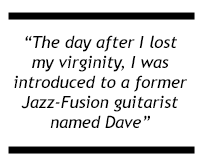
dEUS - Worst Case Scenario - 1994
I came across dEUS in 1994 via MTV Europe, who put their single Suds and Soda on heavy rotation. Three chords, barking vocals, see-sawing violin. It was an absolute racket. Like a college music project where the brief was “You have half an hour to compress the back catalogue of Captain Beefheart and the Velvet Underground into a 4-minute Indie disco floor-filler”. But dEUS managed this, and it was magnificent. Giving a song like that a platform was a batshit move that would seem implausible today, but this was the mid-90’s and I guess there was a lot of money and coke going around, affecting the entertainment industry’s ability to fully understand consequences. In any case, the consequence for me was transformative.
dEUS’s debut album Worst Case Scenario fulfilled every wild and demented promise Suds & Soda had made. While Hotellounge (Be The Death of Me) and Secret Hell indicated the refined and sophisticated band they would become, tracks like Via and Morticiachair were cacophonous walls of sound that regularly caused my elder brother to barge into my room, yelling “This is shit! They can’t even play!” I saw this as confirmation that I’d found something special.
dEUS were also Belgian, which made them mysterious. My only reference points for Belgium at that point were Hercule Poirot and the Zeebrugge ferry disaster, so as with Prince, I was attracted by the otherness of them. They called themselves a “supermarket pop band” but were labelled Art Rock in the press, which was exciting for me because the main thing I learned at art college was that being able to label something as “art” was an excellent blag for the lazy. When my college friends and I eventually formed an Art Rock band, we knew that we could rebrand our musical deficiencies as considered choices and get away with saying things like “We reject the conventional understanding of tuning,” or “Our music isn’t bad, it’s Cubist.”
We sat about planning what we’d say in interviews and made hand-painted t-shirts with our logo on the front. We recorded 30-minute songs of spiralling basslines and distorted skronking guitar, while one of us read stories from the local paper through a toy voice-changing microphone. We were dreadful, we never played a gig together and I have never enjoyed making music more.
Lou Reed – Berlin - 1973
The day after I lost my virginity, I was introduced to a former jazz-fusion guitarist named Dave. These two events are not necessarily connected and putting them side by side kind of makes it sound like I had sex and was immediately placed in touch with the person who would go on to record my personal porno soundtrack. But I mention it because that’s what happened and also because both events were pivotal. The former launched me into a new and adult world, while also teaching me that you should not have sex at a student party unless you’re also willing to have an audience. The latter taught me the fundamentals of song writing and everything I needed to know to be in a functioning band.
Dave was a towering, 25-stone man with tobacco-orange fingertips and teeth to match. His clothes were full of holes. He smelled like he’d been left out in the rain then dried off with his own body heat. But he was a decade older than me so, despite all the available evidence that he made bad choices, I put my faith in him. To be fair, he had some credentials. At 16 he’d been a drummer in a touring hair-metal band. By 20 he had learned to play guitar like Al di Meola. At 22 he’d ditched that and immersed himself in garage punk. By the time I encountered him there wasn’t a type of music he didn’t know about. Within a few weeks of meeting him, he’d moved into my spare room and was giving me a hands-on musical education. Mention a song and he’d play it, then show you how. It was like living with an interactive jukebox, but one that stole your food while you were out and occasionally used your books as toilet paper.
Pretty soon we’d formed a band, where I dedicated myself to holding down the rhythm section while avoiding Dave, who spent his time pouting and hurling his enormous frame around the stage in thrashing circles, aping the dying rotations of a spinning top. The payoff for my efforts was an intense schooling in the music of David Bowie, Leonard Cohen, Scott Walker, The Beach Boys, Lou Reed and Iggy Pop. He was particularly evangelical about Reed’s Berlin album and he spent a lot of time trying to rewrite the songs and rebadge them as his own without being sued for plagiarism. His method was to employ what he called his “hitmaker equation”. Verse from one existing popular song + chorus from different existing popular song = hit.
“Talent imitates, genius steals!” he’d say, as he mashed The Stooges I Wanna Be Your Dog into The Monkees’ Stepping Stone or crafted a turducken of Space Oddity, Walk on the Wild Side and Brown Sugar. He’d mix it up sometimes, lifting the bridge from a Bob Dylan song or a middle eight from Echo and the Bunnymen but the formula was essentially unchanged. We recorded an EP of our box fresh but reassuringly familiar material and spent a good year being astounded by the lack of interest it gained from record companies.
After a while, I lost faith in Dave’s genius and the notion that the world was ready for a 350lb Iggy Pop and quit. I moved to Manchester and got a steady job, still dreaming of music but only playing it on the side. The next time I heard from Dave, it was to learn that he and the rest of my band had a record deal and would soon be appearing on Top of the Pops. Meanwhile, I’d formed a band with three bassists that never made it further than a rehearsal space in Salford, proving that it sometimes took me a while to learn lessons.
Kate Bush – The Kick Inside - 1978
After my first serious relationship ended while I was at Uni, I didn’t really know how to process my emotions and kind of felt like I was going out of my mind. At the time I was living in a house share with my incontinent cat and two very tolerant housemates. One of them, Jay (a human), had been around the block a few times and, noticing that I was circling the drain, gave me a copy of The Kick Inside, which he said would help me. I was suspicious about being prescribed music as a cure, but I played it and found that it worked. It was weird and distracting. So, I played it over and over. I’d lie in bed in the dark listening to her whooping and hollering James and the Cold Gun, while picturing her prancing around in a leotard and wondering if she was single. Eventually, like any junkie, I needed more. I knocked on Jay’s bedroom door. “Have you got any more?”
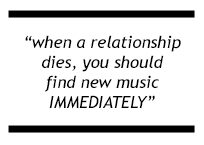
He made me copies of The Hounds of Love and Lionheart and I very quickly found that I needed Kate Bush to get to sleep, the act of falling into the comforting folds of her music becoming part of my nightly ritual. Eventually Jay, whose room shared a wall with mine, burst into my room in the middle of the night. “You need a new girlfriend!” he yelled. “Seriously, this is killing me. I can’t listen to Saxophone Song again.”
But discovering Kate Bush taught me a vital skill. That when a relationship dies, you should find new music immediately, completely disassociated from any that reminds you of your ex or your past. It will save your life. Or at least temporarily allow you to forget it.
Jeff Buckley – Grace - 1994
I decided that I wanted to sing after hearing Grace, which is an absurd reaction really. To listen to a man with a pure 4 ½ octave voice, singing Lilac Wine and think “Yeah, I could do that,” But in any case, it was the start of yet another obsession. I’d missed seeing him play at the Reading Festival one year because I was busy waiting at the front of the main stage for the Red Hot Chili Peppers to come on. When I discovered Buckley and realised how close I’d come to seeing him perform, I dedicated myself to ensuring that wouldn’t happen again.
I tracked down every recording of his that I could find, read every scrap of news, tracked the progress of his upcoming second album. But mostly I dreamed about the possibility that he was coming to the UK and I’d get to experience him in person. And while I waited for that, I lost myself in his music, hoping to find the answers. I felt that if I studied him enough and got to see him perform, I’d learn an essential musical truth and absorb enough of his thing to be able to replicate it myself. One of the many things that appealed to me about Buckley was that he referred to himself as “a chanteuse with a penis,”, flying in the face of the kind of macho posturing that I felt was expected of musicians and knew wasn’t really in me. In short, listening to Jeff Buckley undid the damage the Red Hot Chili Peppers had done of making me believe that I’d have to perform with my shirt off. He was indulgent and over the top, as anyone who’s heard his version of The Way Young Lovers Do will tell you, but he was like that because he could be.
Evangelised by his musical super powers, I tried to convert everyone around me. I proudly played my new girlfriend Mojo Pin, the first track from Grace and an elastic-voiced Buckley showcase that blew my mind every time I heard it. I wanted it to blow her mind too.
“Don’t like it,” she said briskly.
“What?! Why?”
“Because it didn’t do what I expected it to.”
I sulked about this for a while but tried not to judge her too harshly. Musical taste is subjective, even if it can sometimes also be massively and offensively wrong. So, I avoided involving her in my daily business of thinking about Jeff Buckley, listening to Jeff Buckley and waiting for Jeff Buckley to sing in front of me. Understandably, when I learned that he’d drowned in the Mississippi I was devastated. I couldn’t stop thinking of those incredible lungs filling up with dirty river water, that voice being extinguished forever. My girlfriend wasn’t insensitive to this, so took me out for dinner to cheer me up. I thought this was progress, but we ended up having a row in the restaurant about how Michael Bolton was better than Jeff Buckley because Bolton had a 10-octave voice. I argued that this was ridiculous and that the only upside of him having that ability would be that, if he sang at the top of his range, only dogs would be able to hear him. She countered with what she considered to be the Michael Bolton silver bullet.
“Have you heard his version of Sitting on the Dock of the Bay?”
“Yes, which is why I hate him!”
After dinner, we went to see the Beavis and Butthead movie and later, for the entirety of our long journey home, she insisted on doing a Cornholio impersonation. Then we broke up, because some relationships don’t do what you expect them to.
Sparklehorse – It’s a Wonderful Life - 2001
When my daughter was born, her mother and I put together a compilation of music to play to her each night when she went to bed, hoping to slyly mould her future musical tastes. Fragile little tunes by Lambchop, Bonnie Prince Billy, Isobel Campbell and Elliott Smith. Gold Day from Sparklehorse’s It’s a Wonderful Life was the first track on that compilation and became an essential part of our nightly routine. I’d get in from work, feed her, bathe her, read her a story and as I tucked her in and pulled her door to, I’d hear the gentle throb of that song kicking in.
Good Morning, my child/ stay with me a while...
The lyrics were all wrong for that time of day but that didn’t matter to me, seeing as I was also reading her stories before she knew what words were. Or, for that matter, what eating a Petit Filous without smearing it into her own hair was. On the day she was born I received a massive emotional upgrade, reaching previously inaccessible sources of love for another human along with the lingering sense that I would be fearful for her safety until the day I die. Gold Day has become something different too, and hearing it now activates in me a curiously beautiful mix of love and terror.
My daughter is 14 now, makes me cups of tea without me having to ask her to and sometimes, if she sees that I’m tired or sad, sends me to bed then tucks me in. She doesn’t read me a story because that’d be weird but it’ll be one of the many things that I’ll miss when she moves out and I fade into obsolescence until she needs money. She doesn’t listen to Lambchop, Isobel Campbell, Elliott Smith, Bonnie Prince Billy or Sparklehorse because she makes her own musical decisions and that’s correct. I’m glad they’re her choices and not mine. But maybe I’ll make her play Gold Day at my funeral, so that I at least get to prove some kind of point.
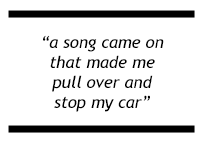
Liam Frost and The Slowdown Family – Show Me How the Spectres Dance- 2006
I was driving to band rehearsal one evening during the mid-2000's, listening to XFM, when a song came on that made me pull over and stop my car. I think it may have been on Clint Boon’s show, but the song was Liam Frost’s The Mourners of St Pauls. When it finished, I just sat there, kind of crushed. It encapsulated so much of what I was aiming to do at the time and underscored everything I was failing to achieve. Liam was clearly someone who’d listened to Jeff Buckley’s Lilac Wine, thought "Yeah, I could do that,” then did that. What’s more, he was only in his early 20’s when he wrote Mourners and when I later bought Show Me How the Spectres Dance I would discover that it’s not even his best song. But for me, it was the right song at the right time and aligned with my growing, rather miserable sense that, as much as I loved music, a career in it was not for me. I had finally reached the point where I was aspiring to be the A-Team van but was still plugging on regardless until Mourners... gave me a revelatory cuff around the ear. My band played its final gig a few weeks later and the last song we performed was a cover of Nik Kershaw’s Wouldn’t It Be Good. And it would’ve been, had music worked out. But it hadn’t, so it wasn’t.
Instead I focussed on writing, which I’d always been told I was better at anyway but was in denial about because I didn’t think it was cool and you didn’t get to stand on a stage and show off. Then I discovered spoken word, which was a middle ground where posturing manfully was an active disadvantage and I could definitely get away with saying that my material was cubist if it went down badly.
Years later Liam and I would become friends, bonding over a mutual love of Jeff Buckley, and together we performed a story that I’d written for a Christmas-themed cabaret event In Manchester. I read a story about getting trapped in a snowdrift with Dave, which segued into Liam singing a cover of Ron Sexsmith’s Maybe This Christmas and everything about it felt very right. I was happy to finally be doing something I felt that I was meant to be doing, while being onstage with someone else who was doing the thing that they were meant to be doing. I still adore music; I play guitar and sing every day. But I just do it for myself now, the only audience who appreciates it.
Bio
Adam Farrer is a creative nonfiction writer and spoken word performer based in Manchester. He is the Editor of The Real Story, an Arts Council England-funded creative nonfiction publisher and spoken word event series. In 2019 Adam became the inagural Writer in Residence for Peel Park, Salford. He is currently working on his first book, The Lost Villages of Holderness, a memoir in essays about life and death on East Yorkshire's Holderness coast.
